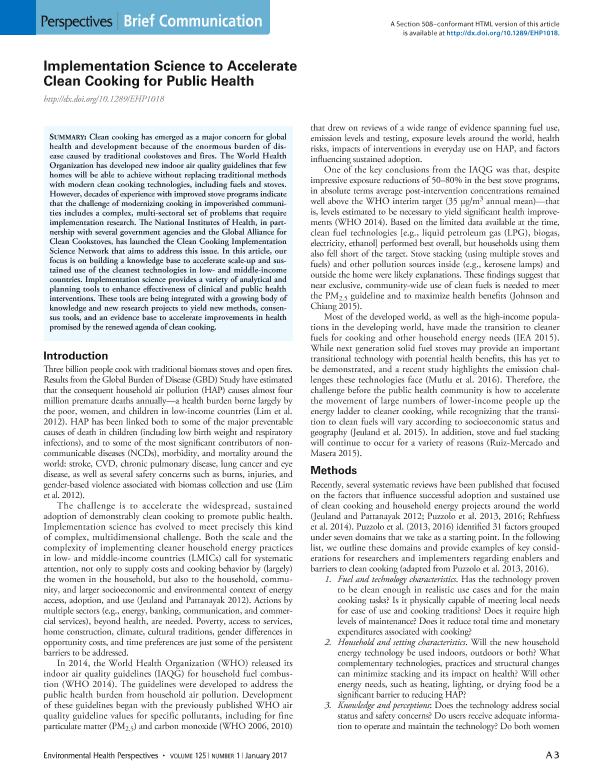Mostrar el registro sencillo del ítem
dc.contributor.author
Rosenthal, Joshua
dc.contributor.author
Balakrishnan, Kalpana
dc.contributor.author
Bruce, Nigel
dc.contributor.author
Chambers, David
dc.contributor.author
Graham, Jay
dc.contributor.author
Jack, Darby
dc.contributor.author
Kline, Lydia
dc.contributor.author
Masera, Omar Raul

dc.contributor.author
Mehta, Sumi
dc.contributor.author
Mercado, Ilse Ruiz
dc.contributor.author
Neta, Gila
dc.contributor.author
Pattanayak, Subhrendu
dc.contributor.author
Puzzolo, Elisa
dc.contributor.author
Petach, Helen
dc.contributor.author
Punturieri, Antonello
dc.contributor.author
Rubinstein, Adolfo Luis

dc.contributor.author
Sage, Michael
dc.contributor.author
Sturke, Rachel
dc.contributor.author
Shankar, Anita
dc.contributor.author
Sherr, Kenny
dc.contributor.author
Smith, Kirk
dc.contributor.author
Yadama, Gautam
dc.date.available
2018-05-14T18:17:54Z
dc.date.issued
2017-01
dc.identifier.citation
Rosenthal, Joshua; Balakrishnan, Kalpana; Bruce, Nigel; Chambers, David; Graham, Jay; et al.; Implementation Science to Accelerate Clean Cooking for Public Health; Us Dept Health Human Sciences Public Health Science; Environmental Health Perspectives; 125; 1; 1-2017; a3-a7
dc.identifier.issn
0091-6765
dc.identifier.uri
http://hdl.handle.net/11336/45112
dc.description.abstract
Clean cooking has emerged as a major concern for global health and development because of the enormous burden of disease caused by traditional cookstoves and fires. The World Health Organization has developed new indoor air quality guidelines that few homes will be able to achieve without replacing traditional methods with modern clean cooking technologies, including fuels and stoves. However, decades of experience with improved stove programs indicate that the challenge of modernizing cooking in impoverished communities includes a complex, multi-sectoral set of problems that require implementation research. The National Institutes of Health, in partnership with several government agencies and the Global Alliance for Clean Cookstoves, has launched the Clean Cooking Implementation Science Network that aims to address this issue. In this article, our focus is on building a knowledge base to accelerate scale-up and sustained use of the cleanest technologies in low- and middle-income countries. Implementation science provides a variety of analytical and planning tools to enhance effectiveness of clinical and public health interventions. These tools are being integrated with a growing body of knowledge and new research projects to yield new methods, consensus tools, and an evidence base to accelerate improvements in health promised by the renewed agenda of clean cooking.
dc.format
application/pdf
dc.language.iso
eng
dc.publisher
Us Dept Health Human Sciences Public Health Science

dc.rights
info:eu-repo/semantics/openAccess
dc.rights.uri
https://creativecommons.org/licenses/by-nc-sa/2.5/ar/
dc.subject
Clean
dc.subject
Cooking
dc.subject
Public
dc.subject
Health
dc.subject.classification
Salud Ocupacional

dc.subject.classification
Ciencias de la Salud

dc.subject.classification
CIENCIAS MÉDICAS Y DE LA SALUD

dc.title
Implementation Science to Accelerate Clean Cooking for Public Health
dc.type
info:eu-repo/semantics/article
dc.type
info:ar-repo/semantics/artículo
dc.type
info:eu-repo/semantics/publishedVersion
dc.date.updated
2018-03-27T15:15:08Z
dc.journal.volume
125
dc.journal.number
1
dc.journal.pagination
a3-a7
dc.journal.pais
Estados Unidos

dc.journal.ciudad
Research Triangle Park
dc.description.fil
Fil: Rosenthal, Joshua. National Institutes Of Health. Fogarty International Center; Estados Unidos
dc.description.fil
Fil: Balakrishnan, Kalpana. Sri Ramachandra University; India
dc.description.fil
Fil: Bruce, Nigel. University of Liverpool; Reino Unido
dc.description.fil
Fil: Chambers, David. National Institutes of Health. National Cancer Institute; Estados Unidos
dc.description.fil
Fil: Graham, Jay. The George Washington University; Estados Unidos
dc.description.fil
Fil: Jack, Darby. Columbia University; Estados Unidos
dc.description.fil
Fil: Kline, Lydia. National Institutes Of Health. Fogarty International Center; Estados Unidos
dc.description.fil
Fil: Masera, Omar Raul. Universidad Nacional Autónoma de México; México
dc.description.fil
Fil: Mehta, Sumi. Global Alliance for Clean Cookstoves; Estados Unidos
dc.description.fil
Fil: Mercado, Ilse Ruiz. Universidad Nacional Autónoma de México; México
dc.description.fil
Fil: Neta, Gila. National Institutes of Health. National Cancer Institute; Estados Unidos
dc.description.fil
Fil: Pattanayak, Subhrendu. University of Duke; Estados Unidos
dc.description.fil
Fil: Puzzolo, Elisa. Global LPG Partnership; Estados Unidos
dc.description.fil
Fil: Petach, Helen. U.S. Agency for International Development; Estados Unidos
dc.description.fil
Fil: Punturieri, Antonello. National Heart, Lung, and Blood Institute; Estados Unidos
dc.description.fil
Fil: Rubinstein, Adolfo Luis. Instituto de Efectividad Clínica y Sanitaria; Argentina. Consejo Nacional de Investigaciones Científicas y Técnicas; Argentina
dc.description.fil
Fil: Sage, Michael. Centers for Disease Control and Prevention; Estados Unidos
dc.description.fil
Fil: Sturke, Rachel. National Institutes Of Health. Fogarty International Center; Estados Unidos
dc.description.fil
Fil: Shankar, Anita. University Johns Hopkins; Estados Unidos
dc.description.fil
Fil: Sherr, Kenny. University of Washington; Estados Unidos
dc.description.fil
Fil: Smith, Kirk. University of California at Berkeley; Estados Unidos
dc.description.fil
Fil: Yadama, Gautam. Washington University in St. Louis; Estados Unidos
dc.journal.title
Environmental Health Perspectives

dc.relation.alternativeid
info:eu-repo/semantics/altIdentifier/doi/http://dx.doi.org/10.1289/EHP1018
dc.relation.alternativeid
info:eu-repo/semantics/altIdentifier/url/https://ehp.niehs.nih.gov/EHP1018/
Archivos asociados
